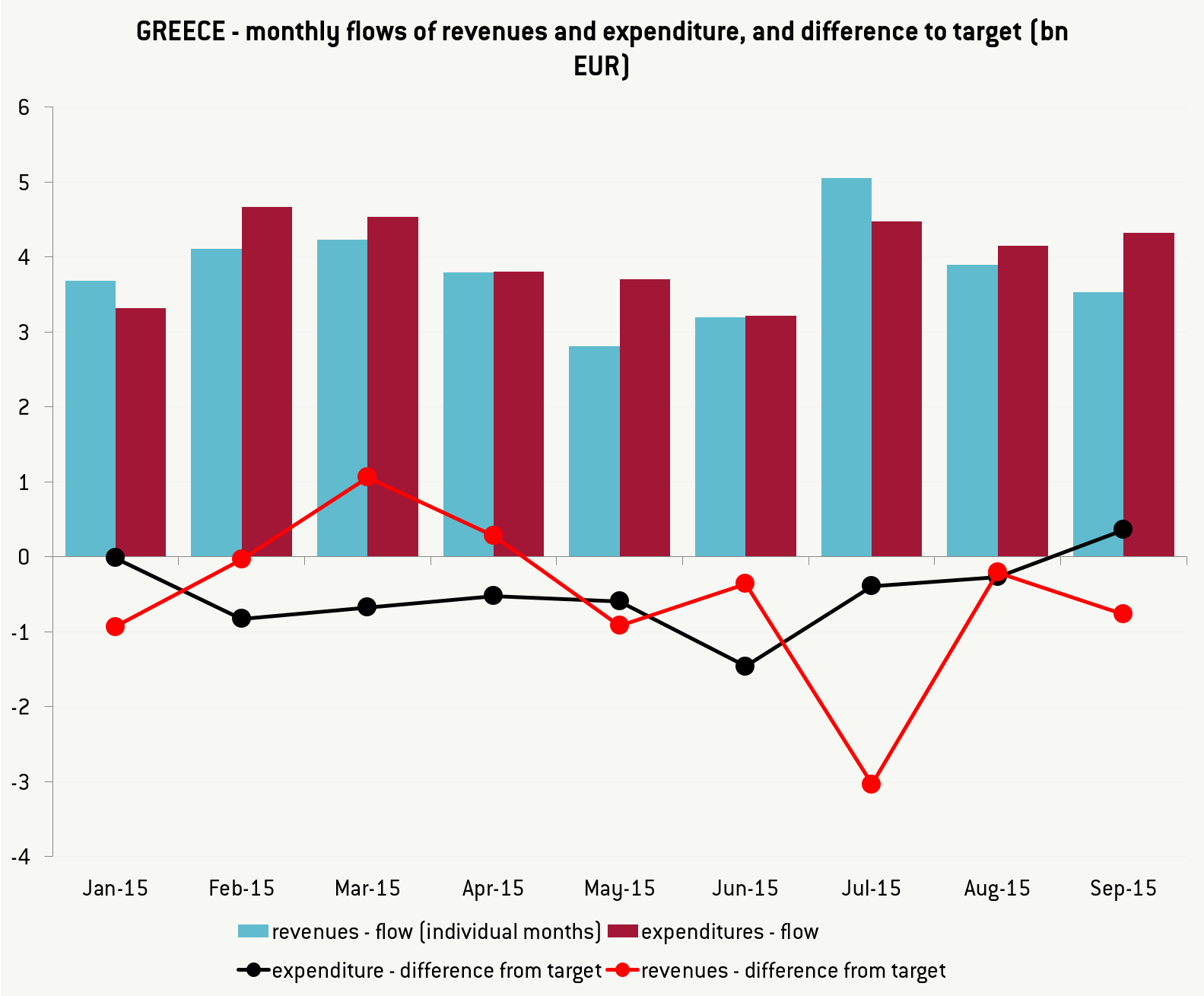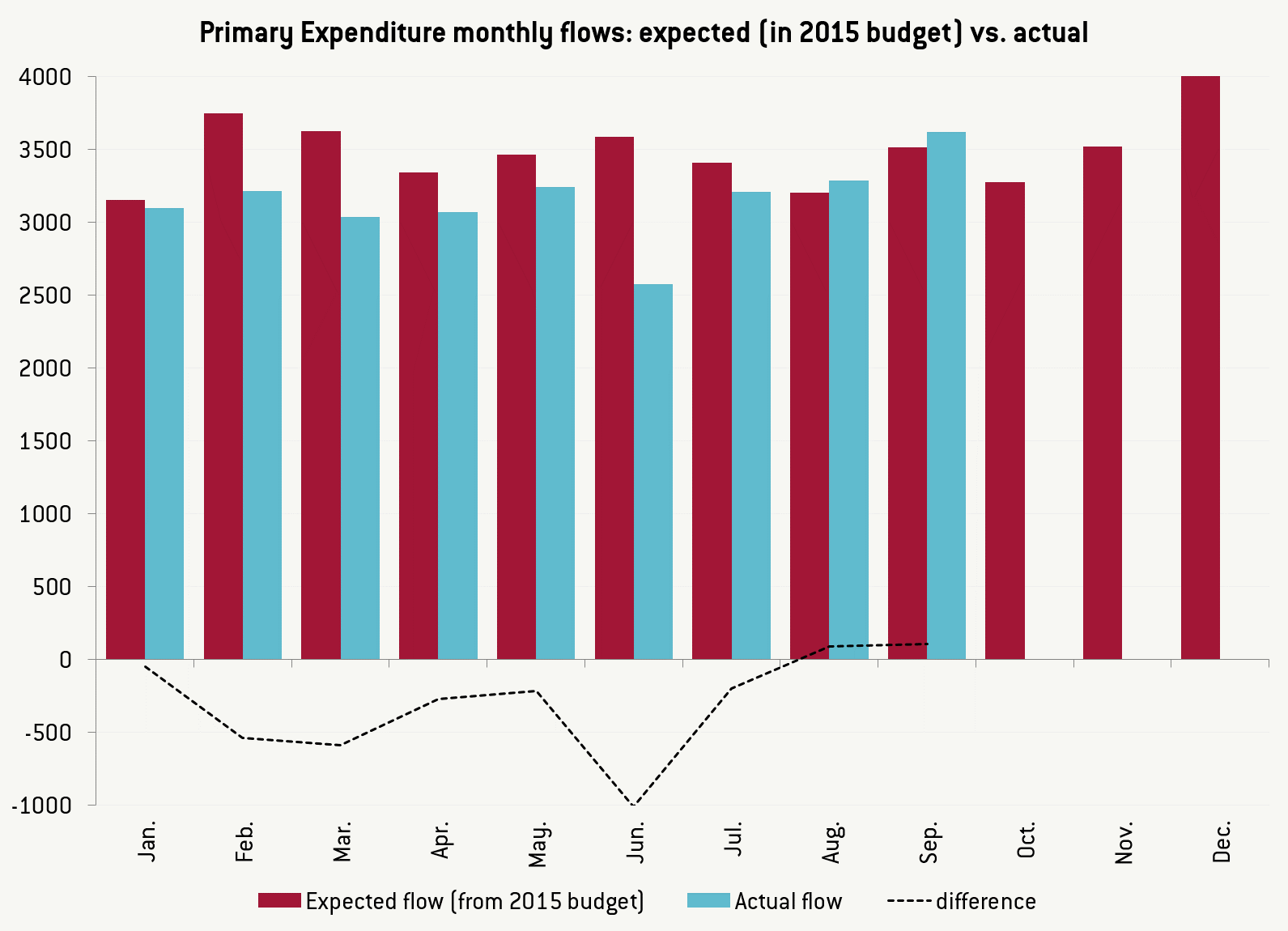What do the latest Greek budget figures show?
Stay up to date:
European Union
While it has to be stressed that the targets considered in the budget execution bulletins are still those from the old 2015 budget (not the new targets under the new programme), this development is nevertheless an interesting reversal of previous tendencies.
The cumulated state budget balance for the first 9 months of the year presented a deficit of 1.9 billion, against a target deficit of 1.4 billion. The state budget primary balance for January – September 2015 remains in surplus, but came in at 3.1 billion against a target surplus of 3.6 billion. Primary surplus overperformance had already eased in July and August, but September has shown the worst reading of primary surplus against the target since February (figure 1).
Source: Ministry of Economy and Finance, Greece
Revenues for the month of September fell back below expectations, reaching 3.5 billion euros, i.e. 762 million or 18% lower than the monthly target. On a cumulative basis, total revenues for the period January-September 2015 stood at 34.3 billion euro, against a target of 39.2 billion. This means that cumulative revenues for the first nine months of the year are currently 4.9 billion below target, and that the significant shortfall observed in July is still weighing on the revenue side. The preliminary statement once again refers to missed ANFA (holdings by National Central Banks’ in their investment portfolio) and SMP (securities market programme) revenues, as well as to non-assessment or receipt of ENFIA (the new property tax) as explanation for part of the shortfall.
On the expenditure side, state budget expenditures for September amounted to 4.3 billion euros, 362 million higher than the monthly target (figure 2). This is the first time since the beginning of the year that total expenditures have exceeded their target, as until now the government had kept the primary surplus above target by drastically cutting expenditures. As a result, from January to September 2015, cumulative state budget expenditures amounted to 36.2 billion euros, 4.4 billion lower than the target. This development in monthly expenditures confirms the change that we highlighted last month, when primary expenditure had increased and slightly exceeded its target for the first time in months. In September, primary expenditure was again slightly above its monthly target (104 million). This translated into total expenditure overshooting for the first time since the beginning of the year (figure 3).
Source: Ministry of Economy and Finance, Greece
The underperformance of revenues and relaxation of expenditure control, which we started to see last month, put pressure on the Greek budget in September. For the first time since February, the primary surplus has underperformed against the target. It needs to be stressed, however, that the targets against which the Ministry of finance evaluate the monthly budget execution are still those in the 2015 budget, but they will soon be updated with the new targets set in the recently discussed 2016 budget document. Whether those targets will prove to be more feasible remains to be seen.
This article was originally published by Bruegel, the Brussels-based think tank. Read the article on their website here. Publication does not imply endorsement of views by the World Economic Forum.
To keep up with the Agenda subscribe to our weekly newsletter.
Author: Silvia Merler is an Affiliate Fellow at Bruegel in August 2013.
Image: A European Union flag flutters outside the Athens stock exchange. REUTERS/Ronen Zvulun.
Don't miss any update on this topic
Create a free account and access your personalized content collection with our latest publications and analyses.
License and Republishing
World Economic Forum articles may be republished in accordance with the Creative Commons Attribution-NonCommercial-NoDerivatives 4.0 International Public License, and in accordance with our Terms of Use.
The views expressed in this article are those of the author alone and not the World Economic Forum.
Related topics:
Forum Stories newsletter
Bringing you weekly curated insights and analysis on the global issues that matter.
More on Financial and Monetary SystemsSee all
Respectful national partnerships key to achieving impact and efficiency in international development
Ruth Goodwin-Groen, Pia Bernadette Roman Tayag, Hinjat Shamil and Tidhar Wald
May 5, 2025
Ana Mahony
April 30, 2025
Graham Pearce
April 30, 2025
Rebecca Geldard
April 29, 2025







